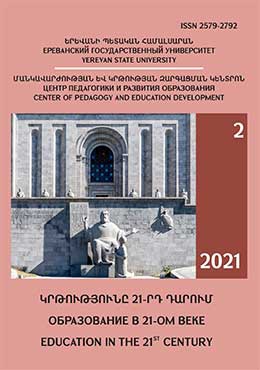PROBLEMS AND CONTEXTS FOR THE DEVELOPMENT OF INTERDISCIPLINARY RESEARCH PROGRAMS IN EDUCATION
DOI:
https://doi.org/10.46991/educ-21st-century.v2i6.10911Keywords:
Keywords: interdisciplinary research; research programs; post-industrial society, network research and innovation projects.Abstract
The article is devoted to the discussion of topical problems of interdisciplinary research in the field of education. The inevitability of the emergence of interdisciplinary research is demonstrated, due to the qualitative transformations of the world during the transition from industrial to post-industrial society; complication of activities; digitalization and transformation of mass practices. At the same time, qualitative changes are taking place in the sciences of education: the significance of the so-called “new history” is increasing; the universalization of the educational process, the inclusion of neurocognitive concepts in the field of education, the high demand for publications indexed in Scopus and Web of Science. Based on the research of recent years, we propose a model for the development and implementation of interdisciplinary research programs focused on the field of education. At the end of the article, the results of the recently completed international scientific and educational Forum are presented, one of the areas of work of which was interdisciplinary research in education, as well as an invitation to all colleagues from Armenia and other partner states to join in the implementation of the project to create a “Network Model of Interdisciplinary Research in education".
References
Бермус А. Г. (2008) Гуманитарная методология в образовании: истоки, контексты, опыт // Педагогика. № 6. С. 15-21.
Бермус А.Г. (2016) К новой парадигме управления инновационными процессами в образовании //Непрерывное образование: XXI век. № 1 (13). С. 2-13.
Бермус А.Г. (2020). К проблеме программирования научных исследований непрерывного образования в полевом подходе. Непрерывное образование: XXI век, (1 (29)), 2-19.
Дудина, В. И. (2012). Социология как экспертная система, эпистемическая культура и поле производства знания. Вестник Санкт-Петербургского университета. Социология, (4), 115-121.
Исаев И.Ф., Иванова В.К., & Тонков Е.В. (2010). Научно-образовательная деятельность кафедры педагогики: от традиций к инновациям. Вопросы журналистики, педагогики, языкознания, 5 ( 6 (77)), 5-22.
Колесников В.А., & Коноплёв Н.С. (2015). Инновационность современного образования: в чем она проявляется? Высшее образование сегодня, (9), 44-49.
Социально-экономические экосистемы в свете системной парадигмы // Системный анализ в экономике – 2018: сборник трудов V Международной научно-практической конференции – биеннале (21–23 ноября 2018) / под общ. ред. Г.Б. Клейнера, С.Е. Щепетовой. М.: Прометей, 2018. С. 5–14.
Фиофанова Ольга (2020). SMART BIG DATA в публичных докладах. Образовательная политика, (4 (84), 70-77.
Autio E., Thomas L.D.W. Innovation ecosystems: implications for innovation management. In the Oxford Handbook of Innovation Management, Dodgson M., Gann D.M., Phillips N. (eds). Oxford University Press: Oxford, UK, 2014.
Gaskell J. and Rubenson K. (2004) Towards a Research Program in Education and Training From the book Educational Outcomes for the Canadian Workplace. https://doi.org/10.3138/9781442674295-001
Jacobides M., Cennamo C., Gawer A. Towards a Theory of Ecosystems. Strategic Management Journal. 2018. Vol.39, Issue 8, pp. 2255–2276.
Wurth B., Stam E., Spigel B. (2021) Toward an Entrepreneurial Ecosystem Research Program. Entrepreneurship Theory and Practice DOI: 10.1177/1042258721998948
Downloads
Published
How to Cite
Issue
Section
License

This work is licensed under a Creative Commons Attribution-NonCommercial 4.0 International License.

